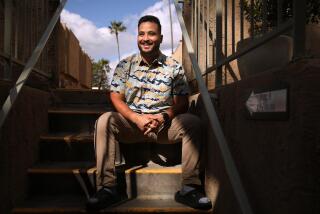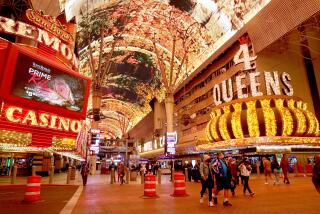Hard Times for Casinos : High Rollers Rolling Out of London
- Share via
LONDON — Where are you, Adnan Khashoggi, when your old haunts need you?
The Saudi businessman, probably best known to Americans as a key middleman in the Iran-Contra scandal, was more famous here as one of the highest of the high rollers, a man who reputedly lost $15 million in his heyday at London’s posh casinos.
Khashoggi’s financial fortunes have taken a turn for the worse lately, and as a result he hasn’t been seen much around the illustrious Mayfair District gaming establishments he used to frequent.
Many other gambling superstars--the sheiks and tycoons seemingly unfazed by dropping several hundred thousand dollars during an evening of roulette--also have disappeared, gaming industry sources lament.
Changing Mores
Partly, the sources say, it is the result of depressed oil prices; partly it is increased competition from other gambling centers such as Australia, and partly it is from changing mores in the increasingly fundamentalist Middle East.
But whatever the cause, the result is that London’s casinos--which are much more dependent on high rollers than their American counterparts--are experiencing an unaccustomed business downturn.
Although final figures will not be published for several weeks, industry regulators and officials at the British Casino Assn. say the so-called “drop” in the city’s 21 gaming establishments--the amount of money exchanged for chips--fell in 1988 for the third year in a row.
Owning a London casino once was considered a virtual license to print money. A government report a decade ago estimated that the typical club earned more than $4 annually for every $1 it had invested. That was nonsense, the industry countered: It made only 80 cents a year on every dollar it put up.
Changing Ownerships
In recent months, however, casinos have been changing hands faster than you can say “blackjack.” The latest example is Crockfords Club, London’s oldest and one of its famous gaming parlors, which was sold recently for a reported $85 million.
In all, a dozen London gambling clubs have been sold in the last two years, and the rest are reportedly on the auction block. Two establishments, Crockfords and Aspinall’s Curzon, have changed hands twice during that period.
A number of the United Kingdom’s 92 other casinos also have changed hands, though not nearly at the rate of the big London clubs, which account for more than two-thirds of the country’s total casino gambling.
“We’ve seen more (turnover) activity in the last couple of years than we saw in a long time before that,” said Peter R. Burleigh, secretary of the Gaming Board for Great Britain, which regulates the industry.
“We don’t know how long this will be before it all settles down,” added an industry official who spoke on condition of anonymity. “I think the London people are worried about the downward trend” in volume, the official said.
“The playboys have gone to ground,” London’s Financial Times newspaper reported last month. “The younger Arab generation is said to have different cultural values to those of the green baize sheiks.”
If this were Las Vegas or Atlantic City, the casino proprietors would simply pull out all the stops to lure new gamblers. But not here.
In the peculiar world of London casinos, advertising is prohibited. So is live entertainment. There are no free drinks, because drinking isn’t allowed at the gaming tables. Credit is illegal, and there are no “impulse” gamblers, because you cannot even place a bet until 48 hours after you apply for club membership.
‘Unfortunate Lapse’
“The British attitude toward gambling is that it’s an unfortunate lapse of Puritan behavior which must be accommodated, but which shouldn’t be encouraged,” explained David Spanier, author of “Easy Money: Inside the Gambler’s Mind” and two other books on gambling. “It mustn’t be enjoyable to gamble,” Spanier added.
Under Britain’s strict 1968 gaming laws, which are credited with keeping out organized crime, only enough casinos are permitted to operate to satisfy the “unstimulated demand” for them.
It’s a strange rule for a country that loves to gamble on almost everything else, Burleigh conceded. “Casinos have been considered sort of alien and foreign and dirty,” he said. By contrast, horse racing is known as the “sport of kings,” and betting on soccer is part of the national heritage.
“There’s something purer about going to the horses and the dogs than going to a casino,” Burleigh said.
A British legislator once advocated that the country’s “immoral” gaming clubs be shut entirely “so that casino characters would then be able to spend more money on honest activities such as racing.”
Despite the restrictions, the British casino industry is reputedly the largest in Europe. The “drop” in 1987, the last year for which full figures are available, was about $3 billion, of which more than $2 billion was in London alone.
Most of that comes from foreign gamblers, many of whom started to frequent London’s casinos after the Lebanese civil war turned Beirut from the playground of the Middle East into a shooting gallery. Wealthy Indians and Chinese from Hong Kong are also frequent players.
Mid-1970s Heyday
The heyday of the high rollers was probably the mid-1970s, when oil prices quadrupled and the value of the British pound dropped sharply. For a time, the now-defunct Ladbroke Club hosted what were generally considered the biggest casino games in the world.
Ladbroke’s was Khashoggi’s favorite hangout. According to London’s Sunday Times, the Saudi arms dealer would arrive late--accompanied by his Italian countess-girlfriend and assorted friends and hangers-on--and take a private elevator to the top-floor casino, then head for the roulette table.
He always played 1,000 pounds a number (more than $2,000 at the time), and made at least 20 bets on each spin. When he won, according to lore, he shouted “Mabruk!” (“Well done!”) and happily threw chips to his inner circle.
Khashoggi wasn’t the only big spender. Another legendary Arab is said to have written 18 million pounds (about $40 million) in checks at the old London Playboy Club in six years. Only 2 million pounds’ worth bounced.
The casinos competed fiercely--and at times illegally--to attract those high-stakes gamblers. One club got in trouble when its agents spotted the expensive cars rolling up to other casinos, checked the license plate numbers with the help of an informant who had access to the national police computer, then invited the high-rolling owners for a free dinner.
Another informant was paid a commission for every gambler he identified through a reputedly unrivaled network of contacts among London hotel staffs. In addition, the informant was paid a flat percentage of the player’s losses if he lured him to the club and had a percentage of his own gambling losses written off.
It was after such tactics came to light that several casinos had their licenses revoked and the last big turnover of London gaming establishments took place.
London’s casinos are tiny by Las Vegas standards, richly decorated and eerily quiet. But what they lack in glitz, they more than make up in style.
The Ritz Club on Piccadilly, for example, has a gourmet restaurant considered to serve some of the finest meals available in a city of fine restaurants. It has a lounge for members that is as big as its main gaming room.
Roulette accounts for nearly two-thirds of all British casino gambling, followed by blackjack and punto banco , or baccarat. Craps tables are relatively rare, and all clubs are limited by law to no more than two slot machines.
“If you allow a lot more machines to come in, it’s a means of leading (the public) on,” said Jack Lynch, the Gaming Board’s chief inspector. “I think there’s always been suspicion toward machines.”
‘Demeaning’ Slots
Some of the top London clubs have no slots whatsoever. “It would demean the place,” sniffed the proprietor of one, who spoke on condition that neither his name nor his club’s be revealed.
About 50 gamblers--or “punters,” as they’re called here--were gathered around three blackjack tables, five roulette wheels and one baccarat table in this proprietor’s club one recent evening. They strolled across thick, custom-woven carpets beneath elaborate chandeliers.
The dealers were almost all attractive young women dressed in stylized red togas. The loudest noises were the clack of chips and the bouncing rattle of roulette balls.
The minimum bet at roulette in this club is two pounds (about $3.50); at blackjack it is 10 pounds ($17.50). But most players bet stacks of five-pound ($8.75) chips at a time. A private salon off the main room catered to those willing to make minimum 100-pound ($175) bets. But there was only one patron there this night.
Mainly Middle Eastern
Among a handful of British customers were two professional soccer players, while the rest of the gamblers were predominantly Middle Eastern.
“I imagine they are still over 50% of our clientele,” the proprietor said, adding that he gets very few Americans. “I don’t think the casinos here are attractive for Americans compared with the fun they can have at home. There’s no exuberance here. It’s a very serious business.”
Indeed, according to Spanier, “one of the drawbacks of all the Arab and other foreign players who are now the lifeblood of British casinos is that they do not have any sense of fun. They just sit there and gamble.”
Or perhaps they just don’t gamble in quite the denominations that Adnan Khashoggi and his pals used to.
CASINO ‘DROP’: IT’S IN THE CHIPS
A look at the amount of money, in millions of pounds, exchanged for chips in British casinos--a figure known as the “drop”--shows an increase in the nationwide total over recent years but a decline in London.
YEAR BRITAIN LONDON 1978 919 696 1979 930 661 1980 930 637 1981 1,007 702 1982 1,218 894 1983 1,299 968 1984 1,482 1,130 1985 1,620 1,235 1986 1,605 1,181 1987 1,673 1,174
Figures are not adjusted for inflation. The 1978-1983 figures are based on fiscal years, while those for 1984 and later are for calendar years. As a result, there is some overlap in the figures for 1983 and 1984. Source: Gaming Board for Great Britain
More to Read
Sign up for Essential California
The most important California stories and recommendations in your inbox every morning.
You may occasionally receive promotional content from the Los Angeles Times.










